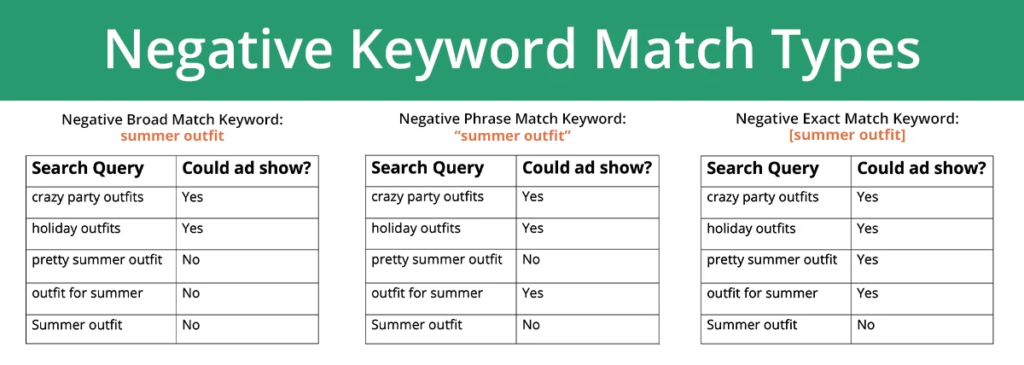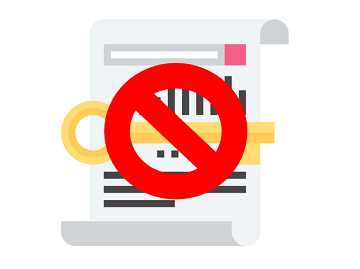Have a look at the use of negative keywords in Google Ads and how they can significantly boost the effectiveness of your campaigns.
Ever since the emergence of Google Ads in 2000, the platform has made a name for itself by being not only the most popular search engine but also a wonderful space for digital marketing. Today, billions of ads get featured on Google, and the Google Network Display every day, bringing back impressive revenue for all parties involved.
However, the immense number of ads businesses are trying to display to users also raises a question: How can we optimize these ads to ensure a high ROI? And the answer lies in negative keywords.
So, either you seek professional advice from a Google ads agency and let them take care of your entire marketing campaign, or you can stay with us to see for yourself how negative keywords have the power to support your ad performance.
What Are Negative Keywords? How Do They Function?
Definition
Negative keywords refer to a mechanism in which your ads will not be shown if specific search terms appear. For example, if you choose “best laptops in 2021” as a negative keyword, then Google Ads will hide your paid content from users who type in that particular phrase.
Categories

There are three main types of negative keywords, each having a different function for your ad campaign. They are namely negative broad match, negative phrase match, and negative exact match.
Negative broad match
Set as the default for any Google Ads campaign, a negative phrase match prevents your ads from appearing if the search includes all the words you predetermine as negative, regardless of their orders.
For example, suppose you set “reusable plastic cup” as your campaign’s negative keyword. In that case, searches like “plastic cup reusable” or “how to make reusable plastic cup” or “plastic reusable cup” will show up without your ads. Vice versa, searches that do not contain all those words, such as “2021 plastic cup” or “benefits of using reusable cups,” will have your ads placed at the top on the search result page.
Negative phrase match
If you want to be more detailed about your ads’ target audience, consider using the negative phrase match. Here, your ads will not display if the search has the exact same words placed in the exact order as your negative keywords. Whether the search term contains other words or if each word has additional characters are not important.
Let’s say the negative phrase match you want to set out is “women jackets.” This allows your ad placement on searches like “best women jacket in 2021” or “jackets women under $200”. But if the search is “cheap women jackets,” then it is a no-no.
Negative exact match
As the name already indicates, this type of negative keyword is the highest in accuracy level. Your ads will be blocked from searches containing the keywords, in the correct order, without any extra words. So if the search term contains the keywords themselves and some more additions, your ads can still appear on it.
Suppose you set your negative keywords as “IELTS online courses.” In this case, searches including “cheap IELTS online courses” are perfectly acceptable for your ads to show up. But any search merely states “IELTS online courses” are off the table.
What Are The Benefits Of Using Negative Keywords In Your Ad Campaign
1. Reduce the ad cost
If you throw your ad randomly at Internet users, hoping some of them would click on it and suddenly become your customer, then it is likely that your campaign will be a flop.
Many campaigns end up with a low ROI because they have to pay for useless clicks without getting any conversion in return. Negative keywords can put a stop to this waste of resources by helping you tighten the target audience and leave out non-profitable searches.
2. Boost the click-through rate
Negative keywords help digital marketers to omit irrelevant searches, thus making sure the ads only appear when the most relevant keywords are typed in. This way, only the section of potential customers is exposed to your ads, creating a higher number of click-throughs generated.
3. Raise your Quality Score
The clickthrough rate, as well as ad relevance, contribute to the final Quality Score – a metric that Google takes into account when ranking your ad biddings. The higher your ads’ score is, the better chances they have to be prioritized by Google. Who does not like their ads to display right at the front of high-volume searches?
Therefore, if you intend on using Google Ads all over again for your business, it is essential that you maximize your Quality score in each campaign to create a consistent performance. From there, Google can provide an unbiased judgment of how your ads did in the past and might as well offer you better ad placements.
4. Higher conversion rate

When you filter through keywords to avoid, feel free to erase non-commercial intent searches or other terms that your business might not be able to convert. Once your ads are 100% focused on the exact service you can offer, the conversion rate is more likely to rise.
5. Narrow down the high-intent target audience
In many campaigns, business owners only pay attention to the relevance of the target audience but fail to consider their buying behaviors. What if a particular group of Internet users fits the description of a potential customer in terms of age, gender, interest, hobbies, etc., but they have already purchased a similar item?
By the time your ads appear, their searches are less about wanting to make another transaction and more about inquiries of product information. Negative keywords enable you to weed out any low-intent searches that might not bring back benefits.
Conclusion
If you have already grasped the concept of negative keywords, then it is time to get to work! But in case you still want some more advice on optimizing your campaigns, why not outsourcing to a Google Ads agency? You can visit website for further information on how to get the best value out of your investment right now!
